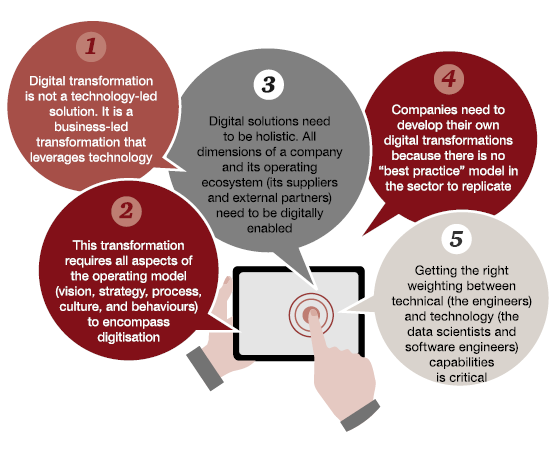Six senior oil and gas executives share their digitisation journey
Upstream oil and gas executives agree that the need to digitise their businesses is now urgent.
With up to $1 trillion in estimated savings in capital and operating expenditures up for grabs over the next seven years, companies that get a head start over their competition will have a distinct advantage.
But knowing where and how to start can be hard, particularly in an industry where no one has yet managed to completely ‘crack’ the digital transformation challenge.
To find out how upstream companies and oil service companies are approaching this issue, we spoke with a group of chief digital officers and leading executives responsible for digital enablement at six companies*. We asked each of them what they were doing to advance digital solutions and embed digital ways of working.
Our conversations were conducted through the lens of five guiding principles for digitisation, outlined in our recent report Drilling for data: Digitising upstream oil and gas.
The discussions with the chief digital officers yielded practical tips on how to approach digitising a company.

Here’s what they had to say.
*We spoke with executives at three leading operators and three leading oil services companies. Two operators cannot be named due to regulatory or confidentiality restrictions. The other operator is Equinor (formerly known as Statoil) and the oil service companies were Baker Hughes General Electric (BHGE), Petrofac and Wood.
A final word
One interesting topic that emerged from the interviews we conducted with leading operators and oil services companies was data sharing.
However, while many of those interviewed saw value in sharing more data across the ecosystem, there was a degree of reticence about sharing certain types of data. There appears to be a spectrum of data sensitivity in this regard. At one end, there is data on equipment performance, which is not considered too sensitive and which some operators may be willing to share. At the other end, we see interpreted subsurface data, which operators are highly unlikely to share, given the commercial sensitivity associated with it. However, in one interview, there was a sense of operators opening up to the sharing of data if oil services companies could demonstrate value in their analytics.
In an era in which oil and gas companies are focused on cost and driving productivity enhancements across their businesses, digital technologies have a critical role to play. Digitisation not only improves efficiency but also helps address other fundamental operational areas, such as safety.
Across all the interviews, it was clear that digitisation should be delivered as part of a broader enterprise-wide transformation. And while there is no single best practice approach to digital transformation, the interviews unearthed seven practical tips about how to approach digitisation in your company:
- Start with a high-level, operational approach
- Collaborate to drive digitisation
- Be aware of the cultural element
- Start a conversation about data sharing
- Find an approach that works for you
- Recognise that data scientists and software developers are in demand
- Pay attention to strategies to attract and retain talent



